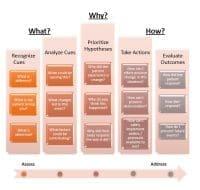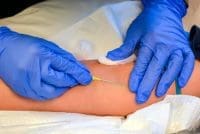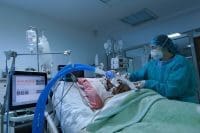“As a Psych Mental Health RN and leader, the loss of life to workplace violence has taken my breath away yet again,” said Dr. Karen Adams DNP, RN, Nurse Manager for Child/Adolescent Behavioral Health at Atrium Health Wake Forest Baptist – Brenner Children’s Hospital. “The concerns of healthcare workers continues to be a concern and no place is void of the impact and exposure to workplace violence.”
Adams, who suffered violence at the hands of a patient at a previous place of employment, said the violent experience she survived was life altering. Now, whenever she witnesses any violent behaviors, she relives that incident.
“Poems are a safe place for me when I find myself overcome with stressful and sad thoughts,” said Adams, noting that this past weekend was particularly difficult for her. “I wanted to share with American Nurse my words of support, devotion, sadness and respect for (June Onkundi’s) family. To all of the nurses who have to return to work without blinking an eye after hearing of the gruesome and senseless loss of her life, I understand.”
She Went to Work
She went to work
on that cool Tuesday morning,
displaying her ritualistic loving goodbyes with her four children and devoted husband.
She went to work
committed to making a difference in the lives of our nations’ most underserved.
She gave so much of herself to help so many hurting humans.
She went to work
with her years of nursing experience and enthusiasm in tow
to advance mental health awareness.
She went to work
excited about her professional nursing goal of beginning her
DNP program in January 2023.
She gave so much on this Tuesday morning in October.
She went to work
cultivating hope to those without it,
extending her commitment to the care of others,
giving of herself; locally and globally.
She went to work
to truly convey kindness
to make an impact
to give back selflessly
to be a part of a professional healthcare team
to be a Nurse.
She went to work
expecting to see her family at the end of the day,
never intending on this day being her last.
She went to work
as she had so many days, months and years before
giving comfort to those who often suffer alone,
emotionally, physically and spiritually.
She went to work
and encountered a patient with a very disturbing past
of violence towards women,
not knowing she would be his next target
of untreated and misdirected aggression.
She went to work
and made the ultimate sacrifice that Tuesday morning.
She went to work
knowing that nursing was her self-proclaimed calling in life.
She did not go to work
Intending to never see her family again
to never help another patient
to not complete her professional and personal goals.
Instead, on Tuesday, October 18, 2022
she became a statistic of workplace violence because
She went to work.
In memoriam of June Onkundi MSN, RN, PMH-NP
Mother
Wife
Daughter
Sister
Friend
Nurse Advocate
Victim of WPV



















2 Comments. Leave new
This. All of this. Thank you June for doing the hardest work. Thank you June for your life’s worth and dedication, devotion, and love for a profession that took so much away from you and the ultimate sacrifice at the sake of caring for others. June, you are a hero and you will not be forgotten. I hope your family is down so much love! Thank you Dr Adams for sharing such vulnerability, passion, compassion, love and empathy! These words and these emotions need to be shared more often across our profession and in many different ways.
This was powerful. Nursing tends to minimize the potential and experienced verbal and psychical assaults from patients. At Cabarrus we started a Behavioral Response team to bring behavioral health experts to the bedside to aide the acute care staff in dealing with difficult pts and have seen a significant reduction in WPV.